#conspiracy to commit election forgery
Explore tagged Tumblr posts
Text
Former President Donald Trump, his former chief of staff Mark Meadows, and Rudy Giuliani are unindicted co-conspirators in the Michigan attorney general's case against the state's so-called "fake electors" in the 2020 election, a state investigator revealed in court on Wednesday.
Michigan Attorney General Dana Nessel charged 16 Republicans last year with forgery and conspiracy to commit election forgery for allegedly attempting to replace Michigan's electoral votes for Joe Biden with electoral votes for Trump at the certification of the vote on Jan. 6, 2021.
During Wednesday's hearing, which was part of preliminary examinations for the so-called fake electors, Howard Shock, a special agent for the attorney general's office, also testified that former Trump attorney Jenna Ellis is also an unindicted co-conspirator.
Shock's revelation was in response to questions from Duane Silverthorn, an attorney for Michele Lundgren, one of the so-called fake electors.
"Finally, former President Donald Trump?" asked Silverthorn.
"Yes," Shock testified.
Ted Goodman, Giuliani's political adviser, said in a statement that the former New York City mayor is "proud to stand up for the countless Americans who raised legitimate concerns surrounding the 2020 U.S. Presidential Election."
"He won't be bullied or pressured into silence by highly partisan actors," the statement said.
Nessel dismissed the charges against one of the alleged fake electors in October in exchange for cooperating with the case. The state is still pursuing charges against the other 15 defendants.
All the defendants have pleaded not guilty.
#us politics#news#republicans#conservatives#donald trump#trump administration#gop#2024#2020 election#Mark Meadows#Rudy Giuliani#michigan#Dana Nessel#fake electors#forgery#conspiracy to commit election forgery#Howard Shock#Jenna Ellis#Michele Lundgren#Duane Silverthorn#Ted Goodman#abc news
8 notes
·
View notes
Text

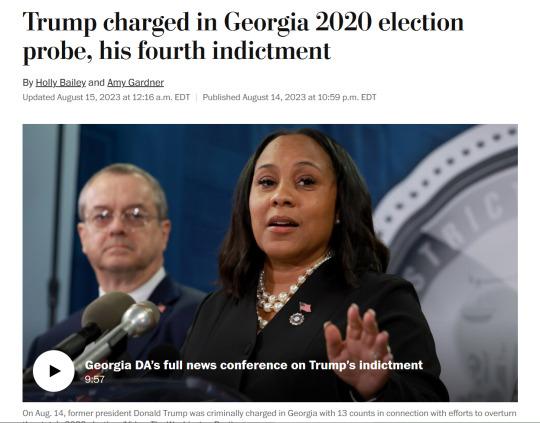
Donald Trump charged in Georgia for efforts to overturn the 2020 election
Link here, because WaPo's security measures stop Tumblr previews. Non-paywall link here.
"Former president Donald Trump and 18 others were criminally charged in Georgia on Monday in connection with efforts to overturn Joe Biden’s 2020 victory in the state, according to an indictment made public late Monday night [on August 14, 2023].
Trump was charged with 13 counts, including violating the state’s racketeering act, soliciting a public officer to violate their oath, conspiring to impersonate a public officer, conspiring to commit forgery in the first degree and conspiring to file false documents.
The Recap
The historic indictment, the fourth to implicate the former president, follows a 2½-year investigation by Fulton County District Attorney Fani T. Willis (D). The probe was launched after audio leaked from a January 2021 phone call during which Trump urged Georgia Secretary of State Brad Raffensperger (R) to question the validity of thousands of ballots, especially in the heavily Democratic Atlanta area, and said he wanted to “find” the votes to erase his 2020 loss in the state.
Willis’s investigation quickly expanded to other alleged efforts by Trumpor his supporters, including trying to thwart the electoral college process, harassing election workers, spreading false information about the voting process in Georgia and compromising election equipment in a rural county. Trump has long decried the Georgia investigation as a “political witch hunt,” defending his calls to Raffensperger and others as “perfect.”
The Details
“Trump and the other Defendants charged in this Indictment refused to accept that Trump lost, and they knowingly and willfully joined a conspiracy to unlawfully change the outcome of the election in favor of Trump,” the indictment states.
A total of 41 charges are brought against 19 defendants in the 98-page indictment. Not all face the same counts, but all have been charged with violating the Georgia Racketeer Influenced and Corrupt Organizations Act. Willis said she has given those charged until Aug. 25 to surrender.
Among those charged are Rudy Giuliani, the former New York mayor who served as Trump’s personal attorney after the election; Trump’s former White House chief of staff Mark Meadows; and several Trump advisers, including attorneys John Eastman, Sidney Powell and Kenneth Chesebro...
Prosecutors brought charges around five subject areas: false statements by Trump allies, including Giuliani, to the Georgia legislature; the breach of voting data in Coffee County; calls Trump made to state officials, including Raffensperger, seeking to overturn Biden’s victory; the harassment of election workers; and the creation of a slate of alternate electors to undermine the legitimate vote. Those charged in the case were implicated in certain parts of what prosecutors presented as a larger enterprise to undermine the election."
-via The Washington Post, August 14, 2023
#trump#donald trump#trump indictment#fani willis#district attorney#united states#us politics#good news#2020 election#january 6#georgia#fulton county#criminal justice#racketeering#rudy giuliani#sidney powell#john eastman#fuck trump
764 notes
·
View notes
Text
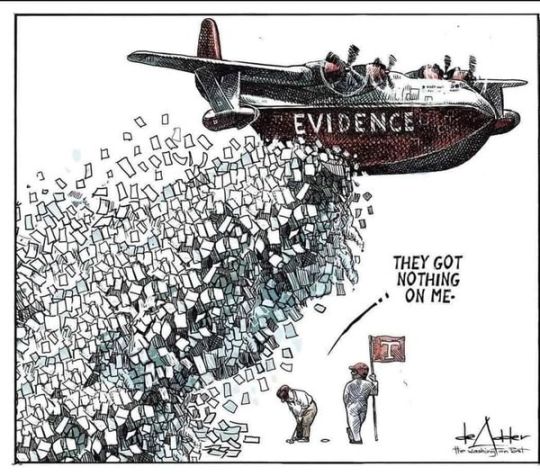
Michael de Adder, Washington Post :: [Robert Scott Horton]
* * * *
Letters From An American
Tonight, just before midnight, the state of Georgia indicted former president Donald J. Trump and 18 others for multiple crimes committed in that state as they tried to steal the 2020 presidential election. A special-purpose grand jury made up of citizens in Fulton County, Georgia, examined evidence and heard from 75 witnesses in the case, and issued a report in January that recommended indictments. A regular grand jury took the final report of the special grand jury into consideration and brought an indictment.
“Trump and the other Defendants charged in this Indictment refused to accept that Trump lost” the 2020 presidential election, the indictment reads, ”and they knowingly and willfully joined a conspiracy to unlawfully change the outcome of the election in favor of Trump. That conspiracy contained a common plan and purpose to commit two or more acts of racketeering activity in Fulton County, Georgia, elsewhere in the State of Georgia, and in other states.”
The indictment alleges that those involved in the “criminal enterprise” “constituted a criminal organization whose members and associates engaged in various related criminal activities including, but not limited to, false statements and writings, impersonating a public officer, forgery, filing false documents, influencing witnesses, computer theft, computer trespass, computer invasion of privacy, conspiracy to defraud the state, acts involving theft, and perjury.”
That is, while claiming to investigate voter fraud, they allegedly committed election fraud.
And that effort has run them afoul of a number of laws, including the Georgia Racketeer Influenced and Corrupt Organizations (RICO) Act, which is broader than federal anti-racketeering laws and carries a mandatory five-year prison term.
Those charged fall into several categories. Trump allies who operated out of the White House include lawyers Rudy Giuliani (who recently conceded in a lawsuit that he lied about Georgia election workers Ruby Freeman and Shaye Moss having stuffed ballot boxes), John Eastman, Kenneth Chesebro, Jeffrey Clark, Jenna Ellis, and Trump’s White House chief of staff Mark Meadows.
Those operating in Georgia to push the scheme to manufacture a false slate of Trump electors to challenge the real Biden electors include lawyer Ray Stallings Smith III, who tried to sell the idea to legislators; Philadelphia political operative Michael Roman; former Georgia Republican chair David James Shafer, who led the fake elector meeting; and Shawn Micah Tresher Still, currently a state senator, who was the secretary of the fake elector meeting.
Those trying to intimidate election worker and witness Ruby Freeman include Stephen Cliffgard Lee, a police chaplain from Illinois; Harrison William Prescott Floyd, executive director of Black Voices for Trump; and Trevian C. Kutti, a publicist for the rapper formerly known as Kanye West.
Those allegedly stealing data from the voting systems in Coffee County, Georgia, and spreading it across the country in an attempt to find weaknesses in the systems that might have opened the way to fraud include Trump lawyer Sidney Powell; former Coffee County Republican Committee chair Cathleen Alston Latham; businessman Scott Graham Hall; and Coffee County election director Misty Hampton, also known as Emily Misty Hayes.
The document also referred to 30 unindicted co-conspirators.
Trump has called the case against him in Georgia partisan and launched a series of attacks on Fulton County District Attorney Fani Willis. Today, Willis told a reporter who asked about Trump’s accusations of partisanship: “I make decisions in this office based on the facts and the law. The law is completely nonpartisan. That's how decisions are made in every case. To date, this office has indicted, since I’ve been sitting as the district attorney, over 12,000 cases. This is the eleventh RICO indictment. We follow the same process. We look at the facts. We look at the law. And we bring charges."
The defendants have until noon on August 25 to surrender themselves to authorities.
Letters From An American
Heather Cox Richardson
#Robert Scott Horton#Washington Post#Michael de Adder#political cartoon#Letters From An American#Heather Cox Richardson#Fani Willis#RICO#Georgia#Indicted#TFG
38 notes
·
View notes
Text
Abusive Sexual Contact
Advocating Overthrow of Government
Aggravated Assault/Battery
Aggravated Identity Theft
Aggravated Sexual Abuse
Aiming a Laser Pointer at an Aircraft
Airplane Hijacking
Anti-racketeering
Antitrust
Armed Robbery
Arson
Assassination
Assault with a Deadly Weapon
Assaulting or Killing Federal Officer
Assisting or Instigating Escape
Attempt to commit Murder/Manslaughter
Bank Burglary
Bankruptcy Fraud/Embezzlement
Bank Larceny
Bank Robbery
Blackmail
Bombing Matters
Bond Default
Breaking and/or Entering Carrier Facilities
Bribery Crimes
Certification of Checks (Fraud)
Child Abuse
Child Exploitation
Child Pornography
Civil Action to Restrain Harassment of a Victim or Witness
Coercion
Commodities Price Fixing
Computer Crime
Concealing Escaped Prisoner
Concealing Person from Arrest
Concealment of Assets
Conspiracy (in matters under FBI jurisdiction)
Conspiracy to Impede or Injure an Officer
Contempt of Court
Continuing Criminal Enterprise
Conveying False Information
Copyright Matters
Counterfeiting
Counterintelligence Crimes
Credit/Debit Card Fraud
Crime Aboard Aircraft
Crimes on Government Reservations
Crimes on Indian Reservations
Criminal Contempt of Court
Criminal Forfeiture
Criminal Infringement of a Copyright
Cyber Crimes
Damage to Religious Property
Delivery to Consignee
Demands Against the U.S.
Destruction of Aircraft or Motor Vehicles Used in Foreign Commerce
Destruction of an Energy Facility
Destruction of Property to Prevent Seizure
Destruction of Records in Federal Investigations and Bankruptcy
Destruction of Corporate Audit Records
Destruction of Veterans’ Memorials
Detention of Armed Vessel
Disclosure of Confidential Information
Domestic Security
Domestic Terrorism
Domestic Violence
Drive-by Shooting
Drug Abuse Violations
Drug Smuggling
Drug Trafficking
DUI/DWI on Federal Property
Economic Espionage
Election Law Crimes
Embezzlement
Embezzlement Against Estate
Entering Train to Commit Crime
Enlistment to Serve Against the U.S.
Environmental Scheme Crimes
Escaping Custody/Escaped Federal Prisoners
Examiner Performing Other Services
Exportation of Drugs
Extortion
Failure to Appear on Felony Offense
Failure to Pay Legal Child Support Obligations
False Bail
False Pretenses
False Statements Relating to Health Care Matters
Falsely Claiming Citizenship
False Declarations before Grand Jury or Court
False Entries in Records of Interstate Carriers
False Information and Hoaxes
False Statement to Obtain Unemployment Compensation
Federal Aviation Act
Federal Civil Rights Violations (hate crimes, police misconduct)
Female Genital Mutilation
Financial Transactions with Foreign Government
First Degree Murder
Flight to Avoid Prosecution or Giving Testimony
Forced Labor
Forcible Rape
Forgery
Fraud Activity in Connection with Electronic Mail
Fraud Against the Government
Genocide
Hacking Crimes
Harboring Terrorists
Harming Animals Used in Law Enforcement
Hate Crime Acts
Homicide
Hostage Taking
Identity Theft
Illegal Possession of Firearms
Immigration Offenses
Impersonator Making Arrest or Search
Importation of Drugs
Influencing Juror by Writing
Injuring Officer
Insider Trading Crimes
Insurance Fraud
Interference with the Operation of a Satellite
International Parental Kidnapping
International Terrorism
Interstate Domestic Violence
Interstate Violation of Protection Order
Larceny
Lobbying with Appropriated Moneys
Mailing Threatening Communications
Major Fraud Against the U.S.
Manslaughter
Medical/Health Care Fraud
Missile Systems Designed to Destroy Aircraft
Misuse of Passport
Misuse of Visas, Permits, or Other Documents
Molestation
Money Laundering
Motor Vehicle Theft
Murder by a Federal Prisoner
Murder Committed During Drug-related Drive-by shooting
Murder Committed in Federal Government Facility
Narcotics Violations
Obstructing Examination of Financial Institution
Obstruction of Court Orders
Obstruction of Federal audit
Obstruction of Justice
Obstruction of Criminal Investigations
Officer Failing to Make Reports
Partial Birth Abortion
Penalties for Neglect or Refusal to Answer Subpoena
Peonage
Perjury
Picketing or Parading
Pirating
Possession by Restricted Persons
Possession of False Papers to Defraud the U.S.
Possession of Narcotics
Possession of Child Pornography
Private Correspondence with Foreign Government
Probation Violation
Product Tampering
Prohibition of Illegal Gambling Businesses
Prostitution
Protection of Foreign Officials
Public Corruption Crimes
Racketeering
Radiological Dispersal Devices
Ransom Money
Rape
Receiving the Proceeds of Extortion
Recording or Listening to Grand or Petit Juries While Deliberating
Reentry of an Alien Removed on National Security Grounds
Registration of Certain Organizations
Reproduction of Citizenship Papers
Resistance to Extradition Agent
Rescue of Seized Property
Retaliating Against a Federal Judge by False Claim or Slander of Title
Retaliating Against a Witness, Victim, or an Informant
Robbery
Robberies and Burglaries Involving Controlled Substances
Sabotage
Sale of Citizenship Papers
Sale of Stolen Vehicles
Searches Without Warrant
Second Degree Murder
Serial Murders
Sexual Abuse
Sexual Abuse of a Minor
Sexual Assault
Sexual Battery
Sexual Conduct with a Minor
Sexual Exploitation
Sex Trafficking
Shoplifting
Smuggling
Solicitation to Commit a Crime of Violence
Stalking (In Violation of Restraining Order)
Stolen Property; Buying, Receiving, or Possessing
Subornation of Perjury
Suits Against Government Officials
Tampering with a Witness, Victim, or Informant
Tampering with Consumer Products
Tampering with Vessels
Theft of Trade Secrets
Torture
Trafficking in Counterfeit Goods or Services
Transmission of Wagering Information (Gambling)
Transportation into State Prohibiting Sale
Transportation of Slaves from U.S.
Transportation of Stolen Vehicles
Transportation of Terrorists
Trespassing
Treason
Unauthorized Removal of Classified Documents
Use of Fire or Explosives to Destroy Property
Use of Weapons of Mass Destruction
Vandalism
Video Voyeurism
Violation of Prohibitions Governing Atomic Weapons
Violence at International airports
Violent Crimes in Aid of Racketeering Activity
Willful Wrecking of a Train Resulting in Death
Wire Fraud
That’s the list of all of my crimes
4 notes
·
View notes
Text
DERSHOWITZ: Gore's team and I contested 2000 vote. Why go after Trump?
Trump "supposedly" lost GA by approximately 10,000+ votes. Stacey Abrams spent 3 years pretending to be GA's governor after losing by 30,000+ votes.🤔
ALAN DERSHOWITZ: Al Gore, his legal team and I tried to find uncounted presidential votes, lobbied officials and fought in the courts in 2000. The only difference now? The candidate's name is Donald Trump... That's why this prosecution is an outrage
By Alan Dershowitz For Dailymail.Com12:17 EDT 16 Aug 2023 , updated 12:56 EDT 16 Aug 2023
Alan Dershowitz is a lawyer, Harvard Law School Professor and author of 'Get Trump: The Threat to Civil Liberties, Due Process, and Our Constitutional Rule of Law'
Electoral challenges have long been part of American history.
Only now are they being criminalized.
I was one of the lawyers involved in objections to Florida's presidential vote in 2000.
A margin of less than 600 ballots determined that Governor George W. Bush rather than Vice President Al Gore won the state and, thus, the electoral college vote.
I was convinced then and I am convinced now that this result was wrong.
No one was indicted, disbarred, disciplined or even much criticized for those efforts, yet here we stand today.
President Donald Trump and 18 other defendants has been charged with election fraud, conspiracy, racketeering and more, under a law designed to take down criminal organizations, known as the RICO Act.
Should Al Gore have been charged in 2000?
What about me?
I represented the voters of Palm Beach County, many of whom voted by mistake for Pat Buchanan rather than Gore because of the infamous butterfly ballots and hanging chads that prevented their votes from being accurately counted.
During the course of our challenges, many tactics similar to those employed in 2020 were attempted.
Lawyers wrote legal memoranda outlining possible courses of conduct, including proposing a slate of alternate electors, who would deliver our preferred election results to Congress.
A margin of less than 600 ballots determined that Governor George W. Bush rather than Vice President Al Gore (above) won the state and, thus, the electoral college vote.
I represented the voters of Palm Beach County, many of whom voted by mistake for Pat Buchanan rather than Gore because of the infamous butterfly ballots (above) and hanging chads that prevented their votes from being accurately counted.
Electoral challenges have long been part of American history, only now are they being criminalized. I was one of the lawyers involved in objections to Florida's presidential vote in 2000. (Above) Alan Dershowitz is a lawyer, Harvard Law School Professor and author of 'Get Trump: The Threat to Civil Liberties, Due Process, and Our Constitutional Rule of Law'
Now, Trump and his attorney Rudy Giuliani, along with others, are accused of conspiracy to commit forgery and false statements for drafting their list of alternate electors.
In 2000, Florida state officials were lobbied to secure recounts in selected counties in which we thought the tally would favor us. We were trying to find at least 600 votes that would change the result.
This new indictment features Trump's phone call with Secretary of State Brad Raffensperger, which was captured in an audio recording. In the conversation, Trump asks Raffensperger to 'find' 12,000 votes.
In my mind, this call is among the most exculpatory pieces of evidence. Trump was entitled as a candidate to ask a Georgia state official to locate votes that he believes were not counted.
In 2000, attempts were made to influence various Florida officials to recount the votes.
Now, the former president's request that Georgia's Republican Speaker of the House reconsider the count is being charged as soliciting a public official to violate his oath.
Florida state officials were lobbied to secure recounts in selected counties in which we thought the tally would favor us. We were trying to find at least 600 votes that would change the result. (Above) Paln Beach, Florida County elections officials conduct presidential vote recount on November 11, 2000
President Donald Trump and 18 other defendants has been charged with election fraud, conspiracy, racketeering and more, under a law designed to take down criminal organizations, known as the RICO Act.
But if similar behavior was legal in 2000, how could it be illegal in 2023?
In the end, all those efforts in Florida failed when the Supreme Court in a five-to-four vote ordered the recounts stopped thereby turning the election over to President George W. Bush.
I wrote a book entitled Supreme Injustice, condemning the Supreme Court's decision and insisting that the election had been stolen from Gore and improperly handed to the candidate who received fewer votes.
The book was a bestseller, featured in front page reviews in the New York Times and other major publications. Most Americans thought that those challenging the Florida vote had acted in good faith, even though the courts ruled against them.
What's different today is that many observers do not believe that Trump and his advisors were sincere when they declared that he had won the election. But that doesn't make what they did a crime.
The Georgia indictment hinges on the allegation that Trump was lying in order to corruptly prevent the inauguration of the candidate who won the election fair and square.
Conspiracy and RICO violations are specific 'intent' crimes. In order to secure a conviction, prosecutors must prove a personalized agreement to join a criminal activity.
That will be an incredibly difficult case to make, especially regarding Trump himself who — to my knowledge – has never wavered from his belief that the election was stolen.
In the end, all those efforts in Florida failed when the Supreme Court in a five-to-four vote ordered the recounts stopped thereby turning the election over to President George W. Bush.
Most Americans thought that those challenging the Florida vote had acted in good faith, even though the courts ruled against them. (Above) Demonstrations at the U.S. Supreme Court in Washington, DC where justices determined whether the Florida recount could continue
He is wrong, but again, that is not enough to prove him guilty.
The First Amendment and general criminal law principles protect the right to be wrong, especially if that right is based on an honest mistake or belief.
Many point to the claim that Trump associates allegedly stole voting machine data, but that accusation is hotly contested. The jury will have to assess the credibility of each side.
The fundamental truth of this indictment is that if the evidence of specific crimes were compelling, there would be no need to charge under the onerous 'intent' requirements of RICO and conspiracy laws. The proof is not compelling, because these electoral challenges have precedent.
Once again, as with the preceding three Trump indictments, the law is being stretched to its limits in order to snare a former president.
'Show me the man, and I'll show you the crime,' is the infamous Soviet-era boast attributed to Joseph Stalin's chief of the secret police.
Is this really what our country has become?
When prosecutions are rooted in the fickle ground of politics and not the solid rock of justice everything will crumble.

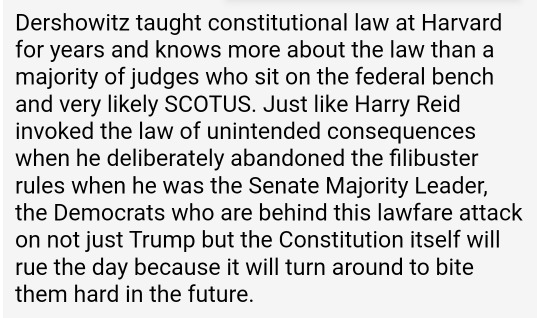

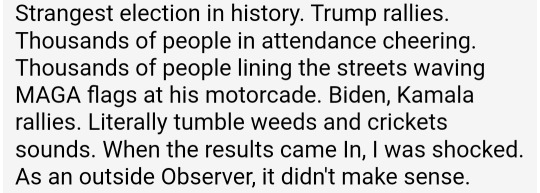


#political persecution#election fraud#election interference#alan dershowitz#al gore#get trump#free trump#banana republic#free speech#georgia#dirty cops#impeach fani back to cali#go back to cali fani!#fulton county
19 notes
·
View notes
Text

More Michigan Republicans Accused Of Being Fake Electors For Trump Plead Not Guilty. The nine defendants were arraigned on eight criminal charges, including conspiracy to commit election forgery. http://ow.ly/Zcrn104QTjf
15 notes
·
View notes
Text

Topline
A Georgia judge on Friday denied bond for Harrison Floyd, the only one of 18 co-defendants in former President Donald Trump’s election interference case in Fulton County to stay in jail, and the former Black Voices for Trump leader has a history of politics and legal trouble.
Key Facts
Floyd, a 39-year-old U.S. Marine veteran, served as the director of the political group Black Voices for Trump during the 2020 election cycle, and was charged last week in the Fulton County case with violating Georgia’s Racketeer Influenced and Corrupt Organizations (RICO) Act, for influencing a witness and conspiracy to commit solicitation of false statements.
According to the indictment, Floyd pressured Ruby Freeman, an election worker in Fulton County, after she refused to change the results of the county’s vote in the 2020 election for Trump, with Freeman testifying before the House January 6 Committee last year that she was forced to leave her home for two months and quit her job after receiving threats after the election.
Floyd, a graduate of George Washington University, had become a prominent Republican in Georgia in recent years, running in 2019 for a Congressional seat.
Floyd dropped out of the race just over a month after announcing his candidacy, saying he “might be the guy doing this in the future,” while expressing his support for a GOP state representative in his place (Democrat Carolyn Bourdeaux won the district in 2020).
In 2020, Floyd led the organization Black Voices for Trump, and also served as executive producer of right-wing outlet Bright News and as a partner at Washington D.C.-based Commonwealth International, according to his LinkedIn page.
Floyd had been charged in a separate case in May with second-degree assault and arrested for allegedly attacking an FBI agent who had served him a grand jury subpoena in the Department of Justice’s investigation into efforts to overturn the results of the 2020 election.
According to a complaint in federal District Court in Maryland, Floyd refused to accept the subpoena, putting his finger to the face of one of two FBI agents who arrived at his residence, yelling: “You haven’t given me anything; I don’t know who the f**k you are.”
Later that night, Floyed called 911, accusing the agents of accosting him and saying: “They were lucky I didn’t have a gun on me, because I would have shot his fucking ass,” the Huffington Post reported.
Forbes has reached out to Floyd’s court-listed attorney in Maryland, Carlos Salvado—Floyd does not have an attorney listed in the Georgia case.
On Friday, Fulton County Judge Emily Richardson denied bond for Floyd after he determined he posed a flight risk and a risk to commit further criminal felonies if released on bail (Georgia state law requires defendants to be determined to pose no “significant risk of fleeing” and pose no “threat or danger to any person” or of committing a felony to be released on bail).
What To Watch For
Richardson said in her determination on Friday that the terms of Floyd’s bond “will be addressed,” but that the full terms fall on Fulton County Judge Scott McAfee, who is overseeing the case. Floyd, however, has contested his bond denial, telling Richardson on Friday: “There is no way I’m a flight risk. I showed up here before the president was here.”
Tangent
Trump was indicted by a grand jury in Fulton County last week on 13 felony counts, including racketeering, solicitation of violation of oath by a public officer, conspiracy to commit forgery, false statements and conspiracy to impersonate a public officer.. After just over a week, Trump surrendered to authorities in a brief procedure on Thursday, posting a $200,000 bond after giving a mug shot and his fingerprints before promptly leaving Georgia. All 18 of his co-defendants also turned themselves in by Friday, with Pastor Stephen Lee becoming the last to do so before the 12 p.m. deadline, following a group of former Trump aides and attorneys, as well as so-called fake electors in Trump’s legal team’s dubious plot to overturn the results of his election loss to President Joe Biden.
Further Reading
Trump Co-Defendant Harrison Floyd Denied Bond: Why He’s Still In Jail (Forbes)
#Who Is Harrison Floyd: Trump Co-Defendant And Black Voices For Trump Leader Still In Fulton County Jail#harrison floyd#trumpets#black trumpers#liars#election fraud#rico#fulton county jail#locked up#Georgia#Fani T Willis DA#Black Voices for Trump
11 notes
·
View notes
Text
By Red Painter
Crooks and Liars
July 18, 2023
Another surprise indictment came Tuesday morning, totally out of left field. Michigan AG Dana Nessel has indicted all 16 of Trump's fake electors - and they are facing A LOT of prison time if convicted. These fake electors were part of a crazy scheme to try to officially provide a legal document that stated - falsely - that Trump was the rightful winner of their state. Even though he WAS NOT and they knew it. They each face 8 charges, including conspiracy to commit forgery, two counts of forgery, conspiracy to commit uttering and publishing, uttering and publishing, conspiracy to commit election law forgery, and two counts of election law forgery. They face up to 14 years in prison if convicted on all counts.
Read more.
11 notes
·
View notes
Text
Michigan’s attorney general filed felony charges Tuesday against 16 Republicans who acted as fake electors for then-President Donald Trump in 2020, accusing them of submitting false certificates that confirmed they were legitimate electors despite Joe Biden’s victory in the state. Attorney General Dana Nessel, a Democrat, announced Tuesday that all 16 people would face eight criminal charges, including forgery and conspiracy to commit election forgery. The top charges carry a maximum penalty of 14 years in prison. The group includes the head of the Republican National Committee’s chapter in Michigan, Kathy Berden, as well as the former co-chair of the Michigan Republican Party, Meshawn Maddock, and Shelby Township Clerk Stan Grot. In seven battleground states, including Michigan, supporters of Trump signed certificates that falsely stated he won their states, not Biden. The fake certificates were ignored, but the attempt has been subject to investigations, including by the House committee that investigated the Jan. 6 insurrection at the U.S. Capitol. “The false electors’ actions undermined the public’s faith in the integrity of our elections and, we believe, also plainly violated the laws by which we administer our elections in Michigan,” Nessel said in a statement.
8 notes
·
View notes
Text
AP News 12/06/23 ...
RENO, Nev. (AP) — A Nevada grand jury on Wednesday indicted six Republicans who submitted certificates to Congress falsely declaring Donald Trump the winner of the 2020 presidential election in their state, making Nevada the third to seek charges against so-called “fake electors.”...
Michigan’s Attorney General filed felony charges in July against 16 Republican fake electors, who would face eight criminal charges including forgery and conspiracy to commit election forgery, though one had charges dropped after reaching a cooperation deal....
In Wisconsin, 10 Republicans who posed as electors settled a civil lawsuit Wednesday, admitting their actions were part of an effort to overturn President Joe Biden’s victory.
Sixteen fake electors also have been charged in Georgia...
Democratic attorneys general in New Mexico and Arizona also are investigating the role of fake electors in their states...."
#ap news 12/06/23#republicans charged as fake electors in 2020#four states have indicted gop members#two more states also investigate
1 note
·
View note
Text
#so i've seen people talk about these new indictments but what are they FOR this time
Solicitation of violation of oath by public officer/False statements and writings: Lying to/trying to solicit help from elected officials in overturning the Georgia 2020 results (”We need to ‘find’ more votes”/”the legislature can overturn the vote”)
Conspiracy to commit forgery in the first degree /Filing false documents/ Conspiracy to commit impersonating a public officer: The Fake Electors scheme
Conspiracy and RICO (because a group of people were working together to do all this)
Some of the co-defendants are also charged with witness intimidation and illegally accessing election equipment.

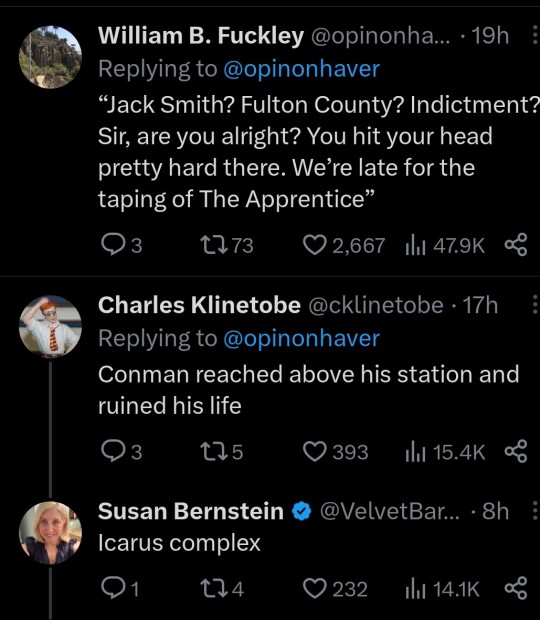

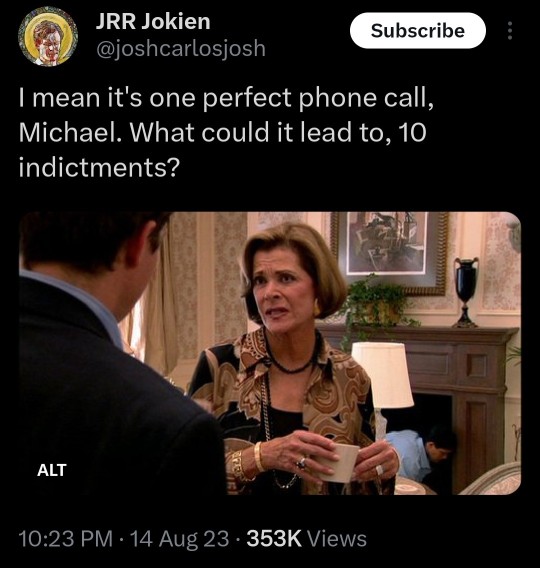
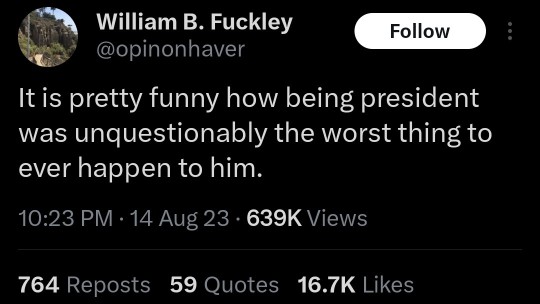
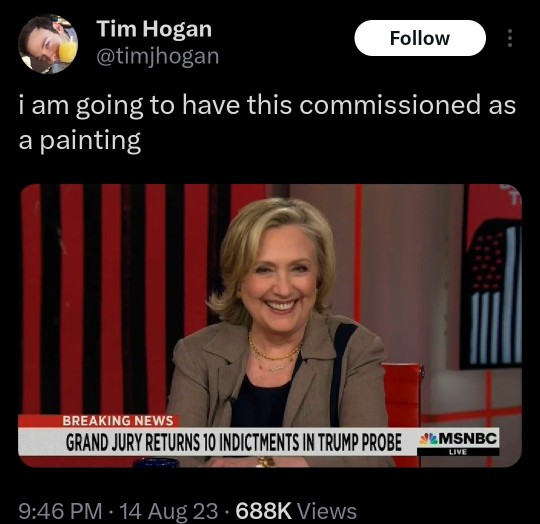
2K notes
·
View notes
Text
Former President Trump Faces 13 Counts of Criminal Charge
By Tannu Punn, The State University of New York Cortland, Class of 2025
August 27, 2023
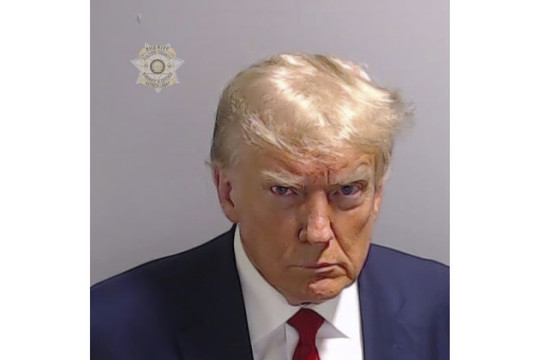
Former President Trump and eighteen others were criminally charged for the efforts to overturn Joe Biden's 2020 win in Georgia. The Atlanta-area grand jury is the fourth jury to implicate Trump, which follows a 2-and-a-half-year investigation by Fulton County District Attorney Fani T. Willis that also resulted in charges against Trump's attorney Rudy Giuliani. The grand jury claimed that all those charged have their arrest warrants ready and have until August 25, 2023, to surrender. Trump and his team have seemed to be open about his surrender, which may occur on or near the day of the first Republican presidential primary debate.
The investigation first began in February 2021, when there was an audio leak between Former President Trump and Georgia Secretary of State Brad Raffensperger. In the recording, Trump was caught saying that he wanted to "find" the votes to reverse Biden's victory in the state of Georgia. Towards the conclusion of the investigation, Trump was charged with 13 counts, including violating the state's racketeering, soliciting a public officer to violate their oath, conspiring to impersonate a public officer, and conspiring to file false documents.
To break all of Trump's 13 counts, one can start with violating Georgia's racketeering act. (RICO- Racketeer Influenced and Corrupt Organizations Act) This Act allows prosecutors to charge a number of people they believe are involved in organized crime. In other words, it allows the prosecutor to connect disconnected crimes, if they believe they are committed as part of one organized crime. All defendants are facing this charge, which began with the wrongdoing that was carried out during the 2020 presidential election. The indictment claims that the group refused to accept that Trump lost the election, so they joined together to change the outcome of the election unlawfully. This group carried out a host of criminal actions to support this goal.
The second charge was the solicitation of violation of oath by a public officer, which relates to Trump's attempt at election fraud. He repeatedly contacted the top Republican leaders in Georgia, including the state's governor, lieutenant governor, and more. However, this charge is more specifically focused on Trump's call with the Speaker of the House, where Trump persuaded him to a special session with the purpose of "unlawfully appointing presidential electors" from Georgia.
Third charge: conspiracy to commit impersonating a public officer. Trump and others were accused of having people "falsely hold themselves as duly elected and qualified presidential electors" from Georgia to be counted. This was all done in favor of pushing for more pro-Trump electors unlawfully.
Fourth charge: Conspiracy to commit forgery in the first degree. This charge is similar to Trump and the others pushing for more Trump electors unlawfully. Specifically, they wrote in writing that they conspired "to knowingly make a document titled 'Certificate of the Votes of the 2020 Electors From Georgia.'" This document was falsely purported to be from actual presidential electors in Georgia.
Fifth charge: Conspiracy to commit false statements and writing. Similarly, this refers to the document described above. Trump and others claimed that the document was signed by "the duly elected and qualified Electors" from Georgia.
Sixth Charge: Conspiracy to commit to filing false statements. This is like the above charge. However, this targets Trump and the others' "knowing" that the document contained materially false statements, but still filing it.
Seventh Charge: Conspiracy to commit forgery in the first degree. This is a similar charge to the previous charge with the claim that the document was signed by qualified presidential electors from the state of Georgia when they did not give such authority and then sent to the Archivist of the US. This document was titled "RE: Notice of Filling of Electoral College Vacancy."
Eighth Charge: Conspiracy to commit false statements and writings. This refers to the same document above, but in this charge, Trump and others are accused of conspiring to make and use of this document, even though it contained false statements
Ninth Charge: Filing false documents. This charge is focused on Trump and Josh Eastman (Trump's lawyer) for conspiring to file a false document in court.
Tenth Charge: Solicitation of violation of oath by a public officer. This charge accuses Trump of persuading Brad Raffensperger, the Republican Secretary of State, to commit a felony by influencing the certified returns for presidential electors in Georgia. He was called by Trump just days before Congress was set to certify the election results saying that he needs to find votes to overcome Biden's victory.
The last three charges similarly focus on false statements and solicitation or violation of oath by a public officer. Calling on other public officials to commit crimes for his wants and desires is a crime and so is filing false statements knowing that they were purported.
As of August 25, 2023, Trump has surrendered to the authorities in Fulton County Jail, and he was later released on bond.
______________________________________________________________
[1] https://www.wsj.com/us-news/law/scott-mcafee-has-been-a-judge-six-months-he-is-now-assigned-trumps-georgia-case-c9beac23
[2] https://www.washingtonpost.com/national-security/2023/08/15/trump-indictment-georgia-charges-fulton-county/
[3] https://www.washingtonpost.com/national-security/2023/08/15/trump-charges-georgia/
0 notes
Text
Donald Trump was arrested in Georgia tonight for his role in what prosecutors christened “a wide-ranging criminal enterprise” aimed at overturning the results of the 2020 election. Trump and 18 others—among them, his former lawyer, Rudolph Giuliani, and Mark Meadows, his former chief of staff—have been formally accused of 41 state-law felonies. The case is brought by Fani Willis, the district attorney of Fulton County, Georgia. Willis is not the first local prosecutor to charge a United States president with a felony, but she is the first to accuse one of trying to steal an election.
Among charges such as filing false documents and conspiracy to commit forgery, Trump is personally accused of trying to browbeat and suborn felony acts from high-ranking Georgia officials, including the chief elections supervisor, secretary of state Brad Raffensperger. Officials were pressed by Trump and other “co-conspirators” to take action to “decertify the election” and “unlawfully appoint presidential electors,” prosecutors claim. Together, the charges opened the door for Willis to pile on additional counts of racketeering. Filed under the state’s Racketeer Influenced and Corrupt Organizations Act, the charge would ask jurors to consider whether Trump and other defendants were involved in a single criminal undertaking. A conviction under RICO does not require that the defendants all know one another or be involved at the same time, so long as they’re all working toward a single corrupt goal.
RICO, which can carry up to a 20-year prison sentence, is a powerful and even dangerous legal weapon. Out of dozens of possible crimes, a prosecutor may have to prove only two to gain a conviction. The state is fairly ambiguous about what constitutes an “enterprise.” Jurors, meanwhile, may be shown a veritable tower of evidence and instructed, usually in some narrative fashion, to see a “pattern” in the defendants’ acts; something the human brain is naturally wired to do, even at a subconscious level. For Trump and his team, allowing the case to progress to the point where a jury is actually deliberating RICO is a doomsday scenario.
In addition to the Georgia prosecution, the cases against Trump include one in Manhattan over “hush money” paid to a porn star; a case filed in Florida federal court over his retention of classified documents; and a federal case in Washington, DC, for his role in the January 6 insurrectionist riot at the US Capitol and efforts to overturn the 2020 election. In total, Trump is facing 91 felony charges. He has pleaded not guilty to each one so far.
The indictment is the culmination of a political career that Trump built by ignoring checks and balances, mocking the law and the courts, and cheering on supporters who use violence in his name, including groups rooted in white nationalism and misogyny, prone to spontaneous and premeditated violence. More than 1,100 of his most committed supporters have been charged in the past 31 months with trying to physically stop Congress from certifying the results of the 2020 election. More than 80 of them have pleaded guilty to beating police officers who had ordered them to disperse. More than 140 officers were reportedly injured, and four of those would die by suicide within 200 days of the event.
These are not Trump's only casualties. Legal experts have long warned that Trump's personal brand of politics—acrimonious, wielding tools of harassment—while deceptively trivial in the face of actual death, millions in damages, and election interference—is corrosive to the very norms and conventions upon which the electoral process has long relied for stability. Prosecuting Trump may help distinguish lawful challenges in future elections from outright criminal acts. But even alone, his arrest has already made clear what norm-breaking behaviors the public will not condone—not now or in the future, regardless of the courts' own views.
In a 2018 book, Harvard University duo Steven Levitsky and Daniel Ziblatt put forward two criteria for the foundation of a healthy democracy: “social norms,” or unwritten codes of conduct upon which the people generally agree. The Trump administration, by the end of its first year, had managed to violate both with a quotidian efficiency. Levitsky and Ziblatt’s norms included “mutual tolerance” and “institutional forbearance.��� The latter describes the need for politicians to show restraint in the exercise of their authority; not to gain the upper hand and immediately use that power to obliterate one’s rivals. “Think of democracy as a game we want to keep playing indefinitely,” they write.
Nothing in this century has done more to stamp out the mutual toleration of Americans than the presidency of Donald Trump. His strategy of painting political rivals as illegitimate and un-American has—for the better part of a decade—chipped away at social and democratic norms that titans of jurisprudence have—for more than a century—called indispensable to a functioning democracy. By the time President Joe Biden took office, the Washington Post had cataloged a decidedly pathological 30,000 false or misleading claims uttered by his predecessor. The Trump administration's ever-broadening palette of ethics violations caused Americans to realize, perhaps for the first time on a national scale, that truly there are few if any laws against some of the most basic forms of corruption; that, instead, conventions and norms—an honor system, essentially—is all that stand between presidents and the gross abuse of their power.
Americans typically point to the US Constitution as the pinnacle of their legal system. Many modern legal theorists, and even the nation’s own founders, painted the concept of state authority in a different light. The Genevan philosopher Rousseau considered la volonté générale, or the “general will” of the people, the only legitimate source of state power. American revolutionaries believed that only laws written with the “consent of the governed” could be considered legitimate. Thomas Jefferson once said the only “fountain of power” is the people, and that only “from them” is power derived. Regarding politicians who believe “supreme power” resides in constitutions, early US Supreme Court justice James Wilson suggested they had perhaps neglected to consider, “with sufficient accuracy, our political system.”
Consequently, democratic institutions are effectively incapable of restraining elected autocrats by their own volition. Without robust norms, traditional checks and balances often prove useless. “The tragic paradox of the electoral route to authoritarianism,” write Levitsky and Ziblatt, “is that democracy's assassins use the very institutions of democracy—gradually, subtly, and even legally—to kill it.” The Georgia case yanks Trump and his associates out of the squishy realm of ���norms violations” and drops them into the cold, hard box of criminality. The best argument for prosecuting Trump under RICO is that it seemingly leaves jurors room to consider both.
The prosecutions of Trump will do nothing to patch America’s deep partisan divide, of course. Legal scholars reasonably believe it will only further inflame hostilities and erode trust in US institutions. Republicans have meanwhile launched an aggressive PR campaign based on the notion of “letting voters decide.” But relying on the vote, rather than jurors who are obligated to consider evidence and draw inferences from facts alone, could itself create a new norm anathema to democratic values. Prosecution was not the first choice. But every other lever that might’ve been pulled to stop and counteract the damage wrought by Trump was left in its place; particularly by Republicans, who’ve never actually been deprived of the means or opportunity to hold the de facto leader of their party accountable. Relying on the very system that Trump previously poured tens of millions of dollars into destroying feels otherwise, at best, like a nation fulfilling a death wish.
For American democracy to thrive, or retain any semblance of the legitimacy it has left, the prosecutorial systems, judges, and jurors in New York, Georgia, Florida, and Washington must grind forward. The law may not always prevent people from profiting off the wrongs they commit. But it cannot be denied outright the chance to decide whether they're stripped of their ill-gotten gains.
Laws are ultimately made “real” by the people against whom they’re imposed, including state officials, who, unlike private citizens, cannot scrape by merely obeying the law. Were judges, legislators, and even presidents to consider only themselves, ignoring the actions of their supervisors, subordinates, and peers, the validity of the legal system—and eventually the system itself—would fall apart. The English legal theorist H. L. A. Hart once wrote that among the "necessary and sufficient” criteria for the existence of a legal system is the requirement that public officials consciously adopt common standards of behavior and “appraise critically their own, and each other’s deviations as lapses.”
For some observers, the concept of "norms violations" during Trump's presidency became erroneously interlinked with the perceived failures of federal oversight officials, mostly by people unaware they were a phantom bulwark all along. A lack of coherence in the mainstays of democracy during Trump’s initial years left too many too focused on the absence of criminal charges, even though equally essential but far less defensible democratic norms were being whittled into dust. Where criminals have laws and courts to contend with, and are beyond the public’s own power to prosecute, social norms are injusticiable—outside the realm of the law, defined by people, their values, and beliefs.
And it’s no secret. The only fleshed-out directive revealed thus far to be implemented by Trump’s hypothetical follow-up presidency aims to see more than 50,000 bureaucrats and civil servants fired in an effort to insulate Trump from legal scrutiny and shield him from potential prosecution down the line. Groups of lobbyists have, according to Axios’ Jonathan Swan, already compiled their “extensive” lists of individuals believed loyal to the president and who fill those ranks instead. This plan is notably the opposite of the restraint on which Levitsky and Ziblatt place so much significance in the upkeep of a healthy and functioning democracy.
0 notes
Text
Here are the post-election incidents that led to Georgia charges against Trump and his allies
Georgia prosecutors allege that former President Donald Trump and his allies broke state laws during about a dozen separate incidents after the 2020 election, according to the indictment made public last Monday.
There are 41 overall charges in the case, which was brought by Fulton County District Attorney Fani Willis. The first charge involves Georgia’s anti-racketeering law known as the Racketeer Influenced and Corrupt Organizations Act, or RICO. But the next 40 non-racketeering charges stem from roughly a dozen key incidents after the 2020 election.
The events, and the crimes the Trump group allegedly committed, break down this way:
Counts 2-4: Presentation of fraud claims to Georgia Senate: Trump lawyer Rudy Giuliani and others are accused of making false statements about election fraud and pressuring members of the Georgia Senate while presenting to a legislative panel in early December 2020.
Count 5: Call to Georgia House Speaker: Trump is charged with asking then-Georgia House Speaker David Ralston to call a special session of the Georgia General Assembly.
Count 6-7: Presentation of fraud claims to Georgia House: Two charges accuse Giuliani and another man of breaking the law as they presented a video of vote counting at State Farm Arena, misconstruing it, to the Georgia House of Representatives.
Count 8-19: Fake electors scheme: This series of charges capture the fake elector scheme. A trio of Georgia residents were charged with crimes including forgery. Trump, Giuliani, Trump lawyer John Eastman and others around Trump's campaign were charged with conspiracies related to the fake electors.
Count 20-21: First attempt to intimidate Atlanta election worker: Illinois pastor Stephen Lee is charged with two charges of attempting to influence witness Ruby Freeman, a 2020 election worker in Fulton County. Prosecutors say Lee went to Freeman's home, knocked on her door and spoke to a neighbor. He was “purporting to offer her help” with the intent to influence her testimony about the vote counting in Atlanta, the indictment said.
Count 22: Trying to get DOJ to intervene in Georgia: Jeffrey Clark is charged with an attempt to make false statements when he tried to persuade the Justice Department to make false assertions in Georgia about the validity of the election's results.
Count 23-26: Communication with Georgia Senate about voter fraud: These four charges capture efforts by Giuliani and others to influence and make false statements to the Georgia Senate on December 30, 2020, when he falsely told them thousands of dead people and felons voted in the election and smeared the vote counting at the State Farm Arena.
Count 27: Filing election lawsuit: This charge accuses Donald Trump and John Eastman of filing false information about votes in a federal court case that sought to block Georgia's election result.
Count 28-29: Phone call to Georgia secretary of state: Donald Trump and his White House Chief of Staff Mark Meadows are charged around the call they made to Georgia Secretary of State Brad Raffensperger on January 2, 2021, where Trump pleaded with Raffensperger to “find” enough votes to flip the results.
Count 30-31: Second attempt to influence Atlanta election worker: Three people are charged with conspiracy to solicit false statements from Ruby Freeman and trying to influence her on January 4, 2021.
Count 32-37: Coffee County voting machine breach: Trump campaign lawyer Sidney Powell and others are accused of conspiracies of computer theft, computer trespassing, invasion of privacy and election fraud related to the breach of voting machines in rural Coffee County, Georgia.
Count 38-39: Letter sent to Georgia Secretary of State: Donald Trump is charged with solicitation and false statements related to a letter he sent to Raffensperger in September 2021.
Count 40-41: Alleged lies to investigators and grand jury perjury: These are two charges that relate to the course of the investigation. Georgia GOP chairman David Shafer is accused of lying to the Fulton County District Attorney's Office investigators. Robert Cheeley is also accused of perjuring himself before the Fulton County Special Purpose Grand Jury.
1 note
·
View note
Link
Donald Trump's New Lawyer's Past Scathing Comments Exposed As OK! previously reported, Trump was ... #movie quote #movies #movie line #movie line #movie scenes #cinema #movie stills #film quotes #film edit #vintage #movie scenes #love quotes #life quotes #positive quotes #vintage #retro #quote #quotes #sayings #cinematography
0 notes
Text
State of Georgia Criminal Indictment of Donald Trump and Associates
in yet another series of criminal charges arrays itself against the former President of the United States of America. It should be noted that former presidents have no special legal protections or influence, but this kind of treatment is unusual. As unusual as this is, Georgia has good reason to bring these indictments forward.
An indictment exists to allow a Grand Jury to accept a prosecutor's claims that a crime has occurs, and allows the judge to weigh in on the process. It is apart of the legal system that is not afforded air time.
As I write this, Trump must defend himself from roughly 91 different alleged crimes related to his actions. The amount doesn't matter, he still is innocent until proven guilty. His innocence is why he is not incarcerated pending trial, although if he pisses off a judge enough then that very well may happen. He doesn't have to appear in person for these pretrial matters, but has chosen to do so.
Donald trump is being charged with:
Violation of the Georgia RICO act, solicitation of violation of oath of a Public Officer, Conspiracy to commit impersonating a Public Officer, conspiracy to commit forgery in the first-degree, Conspiracy to commit false statements and writing, Conspiracy to commit filing false documents, another conspiracy to commit forgery in the first degree, a different conspiracy to commit filing false documents, filing false documents, solicitation of violation of oath by public officer, false statements and writings, another solicitation of violation of oath by public officer, and lastly yet another false statements and writings.
Breaking this list down into a more digestible paragraph, the state of Georgia alleges that defendant Donald Trump conspired as either the conspirator or the actor of a conspiracy to file false things, forged documents, and sought to have an elected officer violate their oath.
Legally a conspiracy involves a conspirator telling various actors to do things. If those things are a crime, then a criminal conspiracy has been founded.
Off the top of my head, Trump has frankly admitted to pressuring the secretary of state to change the certification of the 2020 election, but that surely can't be what this is about. "The phone call was perfect." Surely this can't be about his lawyer, the former mayor Rudy Giuliani going around and filing lawsuits without any plaintiffs? or injured parties? OR ANY PERSON THAT COULD CLAIM ELECTION INTERFERENCE. NO, that can't be it. So what is this about?
let me adopt a more objective voice, because again, Trump and associates are innocent until proven guilty.
The state of Georgia suggests a criminal enterprise of about 30 people, (those that they could identify), committed crimes on behalf of and for Donald Trump. Basically a criminal enterprise exists as a classification for courts to label people, put them into the criminal box so to speak. Think of it like a llc, but for crime... I mean blatantly for crime. it isn't official, but it the loose understanding of the court of how a criminal group is setup, who their members are and who the leaders are.
Basically once this enterprise was established, members of it went around Georgia to various public meetings and entered in false statements. Not the worse crime, but materially false statements are a nuisance to governments everywhere, at best. At worst they influence public policy to actively harm people. The statements sought to make the entire state government change their election outcome.
These charges are about all the threats those officials received, all the pressure they were under, and all the tangible harm they endured to do the basic functions of their election positions. When I sarcastically said this couldn't be about Rudy filing all those election claims incorrectly, I was referencing a troubling period of time in American history where the former president didn't want to cede power. Trump didn't leave because of the kindness of his heart or the rule of law. In my opinion he left because the army was going to evict him when Biden took office. For all of Trump's bluster that the election was stolen or rigged or interfered with, he has produced literally no evidence. Billions have been wasted on his effort to say, Biden couldn't win, I was too popular.
And the most damning thing was, in my opinion, is that he never, ever, let the courts decide. He just repeated the assertion as if that would make it fact.
I think Georgia is going to have a hard time proving these charges because Trump isn't the sort of person to have written orders, although the other co-conspirators are going to say they were ordered by Rudy to do it. and legally that is the same as Trump doing it. Lawyers speak with the power of attorney, meaning that they can handle business and financial matters as their client. They can enter their clients into contracts, and definitely commit crimes on their behalf and the liability can travel through the attorney back to the client.
Trumps big problem with raising a legal defense is that he told Rudy to do all sorts of questionable ethical things in order to get dirt on Joe Biden, or to overturn the election. So much so that the white house legal counsel repeatedly told trump to get rid of Rudy.
and for all I know, the State of Georgia has the kinds of evidence to prove a direct conspiracy to Trump anyway. Again innocent until proven guilty, but man is it an uphill battle for Donald.
0 notes